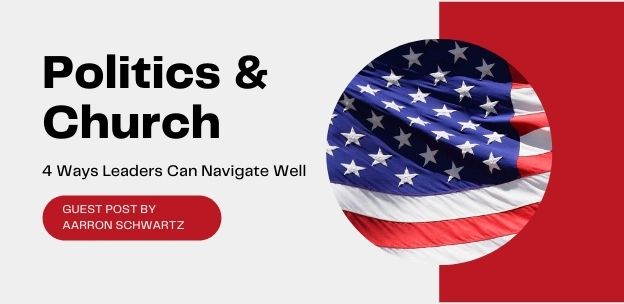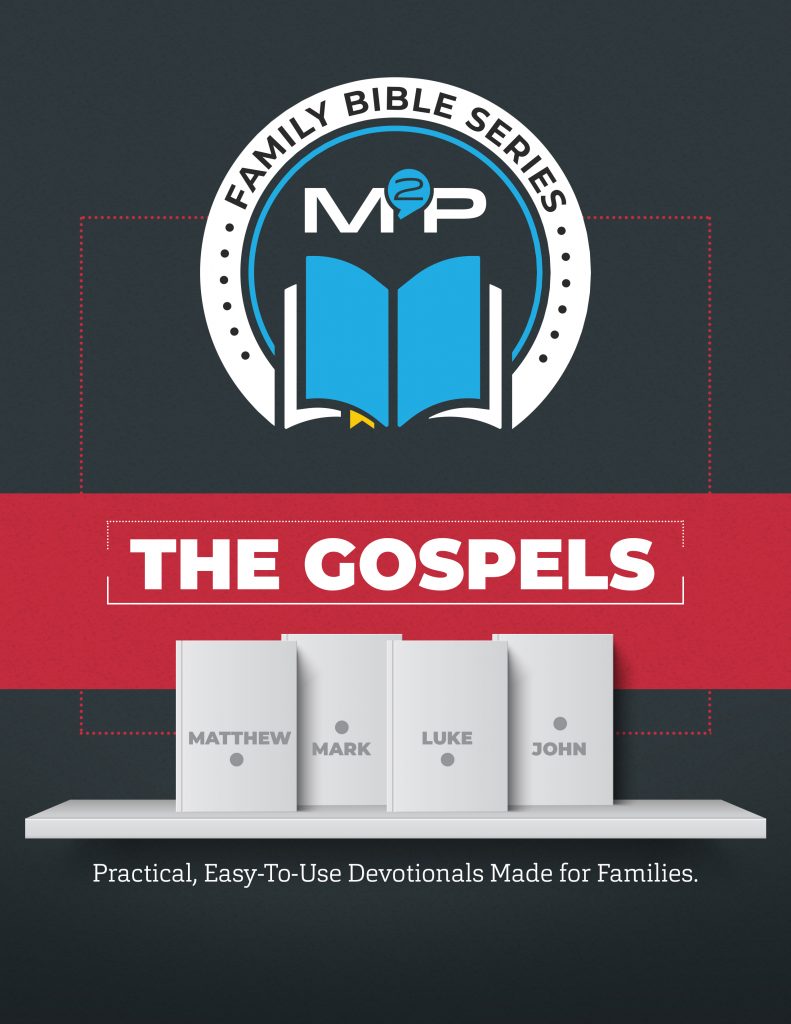Politics & Church: 4 Ways Leaders Can Navigate Well
In every movie, without thinking about it, we search for the hero and the villain. We look for clues that will tell us who to root for, and who to despise. While good storytelling can create sympathy for the bad guy, we are ultimately still glad he “gets it” in the end. There is a comfort in this simplicity that doesn’t exist in real life. Yet, so often this is exactly how we approach politics. We root for our team, and are tempted to turn a blind eye to the player who gets in trouble “off the field.” As long as he can score points for us, we are satisfied. Conversely, that guy on the other team? He’s the worst. He plays dirty. Can’t stand the sight of him, until our team signs him in free agency. Then, well you know…
The truth is, all people are fallen. God alone is good. We’ve repeatedly witnessed the moral failures of our heroes and the redemption of those we thought would never change. So in an age of moral ambiguity, and misinformation, what do we do when the good guys and bad guys are not so well defined? How do we work for what is good, and shun what is evil when so much is unclear and hotly debated in the arena of politics? As leaders, how do we help those who look to us, engage in both meaningful conversation, and redemptive action? Here’s a few practical suggestions:
1. Encourage people to listen.
So often our political convictions come from personal experiences that shape not only our views of the world but our beliefs about others as well. The community you grew up in, the good and bad events in your life, and your interactions with others have a great impact on the way you view both policies and people. We would all acknowledge that it would be impossible to describe an “American” in terms of a singular person with well-defined beliefs. There are certainly some similarities, but also incredible differences. In the same way, not all individuals in political camps are passionate about the same policies, or even totally sure they belong.
Questions allow us to move beyond our preconceived assumptions.
Questions breakthrough impasse. Questions create space for empathy. You don’t have to agree with a person’s solutions, to believe they have valid concerns.
Most of us have seen this principle in leadership. We deal with obstacles to our mission on a daily basis, sometimes from our most committed people. It’s tempting to believe these are always malicious or even sinful attacks. As a pastor, I am convinced that many folks in our churches just want to be heard, and when they don’t sense that anyone is listening, they shout louder, become more obsessed with their concerns, and more convinced of their solutions. They want to know we understand their pain before we propose a method of healing. The same is true in the political conversation.
It is impossible to love people if you don’t know people. Anything short of empathy and understanding produces actions that are a salve for our conscious, but not help for their needs. If we have listened well, we should be able to repeat their concerns in a manner that would have them agreeing wholeheartedly with our summary. We may still agree to disagree, but there will be no doubt that the love of Christ was shown in our willingness to listen.
2. Be bolder in person than you are on social media.
I continue to be shocked at the things people are willing to say on the internet. Social media has become the coward’s billy club. When given a keyboard and time to stew in our own anger, it’s incredible how “digital courage” can overtake us. Passive-aggressive pot shots, Volcanic bitterness, and personal assaults have become commonplace. None of this is for the purpose of resolution. It is vindication, and vengeance that we want. Unfortunately, the majority of our political discourse happens in this context. Not exactly fertile soil for compassion.
Of course, that’s not to say there is nothing redemptive about social media. It has given us avenues to connect with people we might never meet otherwise, and reach out to those who are isolated and in desperate need of care. We just need to accept that it is not the best venue for many of our most important discussions. Without the ability to read facial expressions, and given infinite time to formulate responses, it’s easy to assume too much and empathize too little. We feel bold when staring at a screen instead of the eyes of a fellow human being. But, don’t mistake desperation for boldness. Desperation is birthed from fear, and aims to defend one’s territory, while boldness is a fruit of the Spirit which is willing to sacrifice.
True boldness is rooted and grounded in the love of Christ, not arrogance or insecurity.
It is joyful, confident, peaceful, and gentle. Spirit boldness gives us not just the ability to speak the truth in love, but to listen with genuine care. While we can certainly be Spirit-led in our political conversations online, we must be aware that it can also too easily devolve into virtual grenade throwing.
3. Address issues without vilifying (or coronating) people.
King David after having his life threatened multiple times, and knowing he had already been anointed the next king of Israel, continued to refer to Saul as “the Lord’s anointed.” David refused to exact revenge, even when God had “delivered” Saul into his hands. David’s men egged him on, begging him to kill Saul while he had the chance. Instead, David spoke to Saul with respect, while also clearly addressing Saul’s sins against him. This is a fantastic example of addressing the issues without condemning the person.
We must be honest, direct, and compassionate as we discuss issues and beliefs. Right and wrong apply to all creation, not just our “enemies.” We cannot expect God to be honored by falsehoods, or immoral behavior, even when we believe it is in defense of a position we think is good. In short, we cannot use the devil’s tools to accomplish God’s purposes. Equally important is our refusal to condemn people.
When we condemn or pass judgment on people instead of ideas, policies, or actions, we move into territory not meant for us.
We have been given the mission of redemption. This means we are to hold on to the hope that Jesus can redeem (buyback, make new, save, change) anyone. That doesn’t mean it comes easy, or without healthy boundaries, but we must never lose sight of our identity as Jesus followers who bring the good news to all. Even to those with whom we disagree.
Labels are not helpful. “Right-wing” Leftist,” “Fundy,” “Liberal.” Labels are often a convenient way of ignoring or condemning a person. Once we label them, we have convinced ourselves there is no need for discussion and certainly no hope for redemption. They are the enemy. They are the problem. They are the scapegoat for all the ills of society. We no longer need to look within, once we have found the villain.
Crowning someone as a champion of our ideologies can be just as dangerous. It is their job to right the wrongs. Like the Philistines trotted out Goliath, we too look to our champion to fight our battles and do our bidding. Passivity and even idolatry are sure to follow, once we crown our king. We inevitably refuse to see flaws and abuses that may discredit the very beliefs we hold dear. No one is without hope, nor is anyone, apart from Jesus, the hope of the world.
4. Remember nothing has changed.
A few days ago, I sat down on my couch at the end of a long day, attempting to calm my heart and head. I could not stop thinking about the racial, political, and health issues that face our church and our country. It felt utterly overwhelming. It’s me and, I’m sure, your desire to bring real leadership during a time when our people need it most, and all I could do was think about how I could confront these issues. Seminary doesn’t train you for a pandemic, nor does it make you an expert in government or even sociology. Right then in a moment of fear and confusion, I heard God whisper, “Love Me, and Love your neighbor as yourself.” Clear. Simple. Timeless. What a great reminder, not only for us but for those we lead!
We don’t have to, and we can’t solve all the world’s problems, but we can love.
We can start each day striving to better know God, and love people. We can trust that if we ask, His Spirit will give us wisdom in how to love well. We don’t all agree on how the government should function to best serve its people, but all Christians should agree that any politic or worldview that allows us to abdicate our responsibility to love our neighbors, is not a Christian one. We bring the Spirit of God, and the heart of God into every aspect of life, including politics and political discourse. What better place for the love of Christ to be demonstrated? If we will love Him and others, He will take care of the results.
If you are like me, this has been one of the most difficult, isolating, and chaotic periods of your ministry, but if you look, I know you will see how God is working not only in spite of this period of societal and political unrest but through it. Take heart, He has overcome the world.
Listen well.
Be bold.
Don’t condemn.
Love without exception.
Aarron Schwartz, his wife Crystal, and their 2 children, Judah and Chayah live in Nashville, TN. They helped plant Restoration Church in 2009. Aarron has a passion for the scriptures, a love for Van Halen, and current treehouse project he pretends is for his kids.


